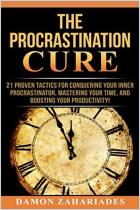Зарегистрируйтесь на getAbstract, чтобы получить доступ к этому краткому изложению.

Зарегистрируйтесь на getAbstract, чтобы получить доступ к этому краткому изложению.
Neil Fiore
The Now Habit
A Strategic Program for Overcoming Procrastination and Enjoying Guilt-Free Play
TarcherPerigee, 2007
Что внутри?
Neil Fiore’s classic advice can help you overcome procrastination.
Recommendation
Psychologist Neil A. Fiore’s believes procrastination is an outdated habit used to protect yourself from fear of failure and self-criticism. Fiore offers examples, strategies and concrete exercises to help you escape the anxiety, unhappiness and alienation that result from procrastination. Learn why you procrastinate, how it serves you and how to start taking charge of your life and time.
Summary
About the Author
Neil A. Fiore, PhD, is a licensed psychologist and a management consultant to industrial, educational and health care organizations. He publishes extensively and speaks often on radio and television.























Comment on this summary